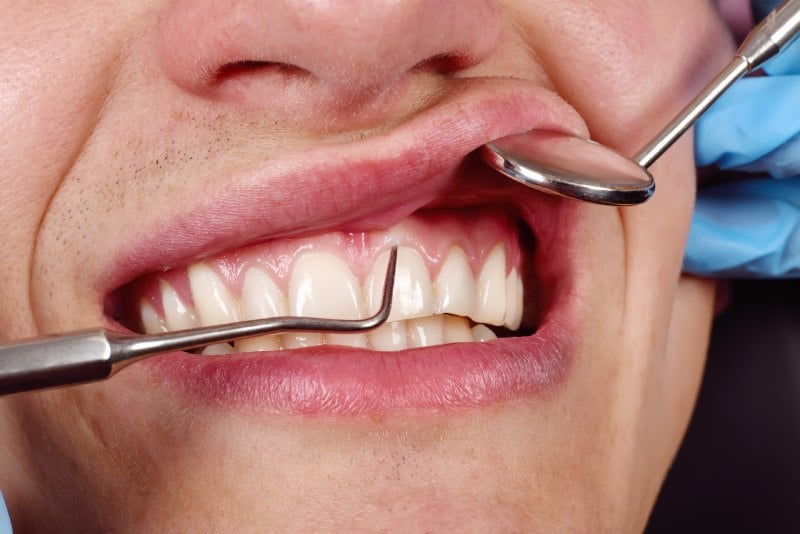Menu
Free Consultation

Surgical intervention may be required to eliminate some of the health problems experienced related to the gums. Due to the plaques that accumulate on the tooth surfaces, the formation of dental calculi and gum diseases may occur over time. If gum disease progresses, destruction of the bone structure that supports the tooth and, accordingly, tooth loss can be observed. The most effective way to prevent gum diseases that negatively affect overall health is not to disrupt routine dental examinations and regular cleaning of dental calculi. However, in case of bone destruction or gum disease, it may be possible to perform periodontal surgical procedures.
How gum surgery will be performed may vary depending on the current situation, discomfort and the degree of discomfort for each patient. The dentist first of all examines the patient in detail. If he decides that gum surgery is needed, he applies local anesthesia.
Depending on the condition to be treated during the operation, it may be necessary to make an incision in the gums, remove inflamed tissues and reshape them. Stitches are placed at the incision sites to complete the operation. After this procedure, the healing process of the gums begins. In order for this process to progress quickly and healthily, the medications prescribed by the doctor should be used regularly. The stitches in the gums are checked by removing them within the period determined by the dentist.

The surgical procedure used in the treatment of gum diseases is called gum surgery. If the tissues around the teeth become inflamed and damaged, and if these problems progress, gum surgery may need to be performed. There are several different conditions that require gum surgery to be performed.
As part of periodontology surgical procedures, gum tissues are typically rearranged and the gum shape can be fixed by improving its function. In this way, problems that may trigger oral hygiene problems are eliminated, the gums are restored to a suitable condition for providing long-term care, and it becomes easier to maintain oral health.
In advanced periodontal diseases, it may be necessary to apply surgical periodontal treatments. As part of surgical periodontal treatments, dental calculi in the deep pockets surrounding the teeth are cleaned and the pockets are eliminated. Creating a smooth and firm root surface also means providing patients with a gum surface where they can provide hygiene more easily. It is possible to treat gum retractions by repairing them with a free gum graft or connective tissue operations.
A flap operation can be performed to provide the necessary plaque control by preventing the progression of periodontal diseases. The flap operation is performed under local anesthesia. After the area is numb, the inflamed tissues are cleaned by removing the gum so that the bone is exposed with the root surfaces. In addition, the root surfaces are flattened and the necessary corrections are made to the bone. Depending on the degree of damage to the bone, it may be possible to complete the procedure using a graft.
Flap operation is one of the most commonly performed periodontology surgical procedures. If harmful bacteria in the gum line where the gum and teeth meet are not cleaned and proper treatment is not applied, pain, tenderness and bleeding may develop along with inflammation of the tissues. In even more advanced cases, gum diseases can cause the loss of the bone structure that supports the tooth or various problems in the body.
These are the procedures that are brought up in case of thickening at the edges of the patient's gum. After local anesthesia is applied, the gum is given a physiological form, fibrotic gum growths are treated, and the morphology of the gum is corrected.
How long the gum surgery will take may vary depending on the type of surgical procedure to be performed and the size of the application area. In cases where a small procedure will be performed, gum surgery will be completed in a shorter time, while more extensive procedures may take up to a few hours.
Gum surgery can be defined as a surgical procedure aimed at restoring gum health that has deteriorated for various reasons and providing smile aesthetics. Gum surgery can be successfully completed as long as it is planned specifically for the patient, applied by specialists and experienced dentists in the field with the right techniques. On the other hand, the patient's general health condition, age and many other factors can trigger the risks associated with gum surgery, as with any surgical procedure.
It is possible to sort the risks of gum surgery as follows:

The postoperative process is of critical importance for gum surgery to be successful. In this context, many different points should be taken into account after gum surgery. The main elements to be considered after periodontal surgery can be listed as follows:
